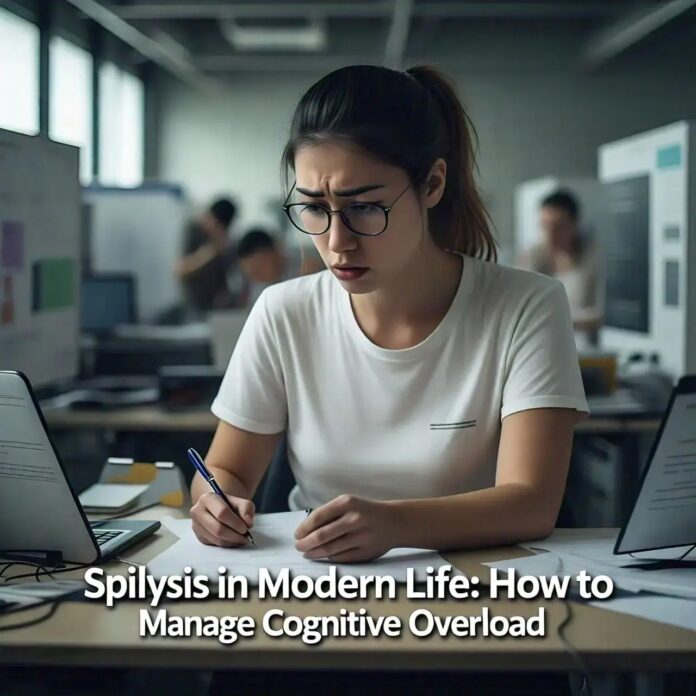Spillysis – In this frantic life we are living in today, it is no surprise that the term cognitive overload has been in use to describe people’s experiences. One of the examples can be trying to complete a few tasks while dealing with many other interruptions. One word that best describes the contemporary problem is Spillysis. While this term is not popular in the general field of psychology, it is beginning to gain acceptance as an explanation of being mentally and conceptually drained, which is characterized by been cognitive tired as a result of trying to catch up with modern society.
We will go into more detail about what Spillysis is, how it interferes with people’s mental processes, and how to deal with cognitive overload in order to live an easier and more working life.
So, what exactly is Spillysis?
Spillysis is the numbness at an emotional or physical level and the inability to focus, memorize, or have a healthy form of attention, all of which are indicators of neural scrabbling. People attempt to balance their tasks but as their attempts increase the mental limits are reached, for instance, when a person tries to balance a number of different errands and fails, it is when the spill occurs. In a way, it is similar to ‘spilling’ a liquid. Spillysis, according to the new phrase, asserts the mental load under the environment where there is a higher density of the people interacting. It explains that unable to concentrate results in unwanted time and efforts to produce insignificant outcomes.
Spillysis is primarily described as an anthropogenic cognitive ailment that arises when we fail to grapples with the challenges posed by modern society. Be it the constant ping of notifications, multi-tasking or being ‘on’ at all times, modern life is filled with cognitive threats and that can easily stretch our brain’s capacity.
The Causes of Spillysis
There are a decent number of reasons due to which Spillysis has become so common in modern life:
Information Overload
We are surrounded by phones, TVs, computers and the internet, all of which bombard us with never ending streams of information. This can result in an overflowing of data in our cognitive systems which makes it all the more difficult to distinguish important information from useless information.
Multitasking
The best example for this is the concept of multitasking as it is often seen as a skill required for being more productive. However, studies suggest that it actually diminishes our ability to be efficient as rapidly switching between tasks will only give birth to chaos in our brain, resulting in the degradation of good decision making along with aiding cognitive fatigue.
Constant Distractions
Now add social media and its countless apps to this mix, when this is combined with our very own devices, such as smartphones and computers, it makes it all the more worse. Every ping of notification turns into a distraction which only worsens the already existing cognitive overload.
Disbalance Destruction
There is no doubt that in this globalized world it is extremely hard to completely disassociate oneself from work. Whether it’s work emails, work meetings or work deadlines, everything encroaches on personal time and lowers the mental ability required to recuperate.
How Spillysis Can Alter Your Mental State
Mental load can be defined as the work that a person has to think about, whereas physical load is more straightforward as it is the work that is to be done physically rather than imagined, and Spillysis is known to create both. As an example, a few common symptoms of cognitive burden are.
Less Ability to Think
The Amount of work that is presented in front of a brain that suffers from mental load is visibly overwhelming and competing forces dilute the efforts of the brain to focus thus in the end all the relevant points are lost. This affects the overall efficiency and leads to mistakes and missing out several important aspects.
Higher Anxiety
Being mentally loaded leads to a greater level of stress, and stress has nasty side effects, The most dangerous being its role in contributing to other negative effects such as the peaks of sadness, anxiety, and so forth.
Cognitive Impairment
Information retention was never easy but, when the brain is constantly being bombarded with work and stressed out even in the most casual tasks information retention aka “remembering” becomes even harder, driving a person to forget even the most crucial and easier findings.
Overthinking
In the current era, people are constantly trying to maximize productivity which leads them to decision overriching, And this results in exhaustion, bluntly putting it far and wide the amount of choices prevent effective ones from being made.
How to Deal with Cognitive Overload Due to Low Attention Span
Listen up folks, especially in this day and age, managing brain freeze and *spillysis* is extremely important. Here are some tips and tricks that will help you manage span issues and break the mental block:
1. Organize Your Work Load
Start with dealing with the tasks that require your attention the most by breaking them down into parts that you might find easier to handle. Apps and tools like calendars or even notebooks can do the job and keep track of the smaller tasks. This way all three do not simply remain undone due to power of procrastination.
2. Manage The Hours You Spend On Your Mobile Device
We live in a world where silence is an equal measure of stress, so consider this as a means of self care. Turn off or limit your notifications, schedule times to not use your mobile device. Probably do this in the mornings and the evenings right before bed instead of keeping your brain thinking 24/7
3. Focus Exercise
In order to take a break from the quick scrolling hook on your brain, try exercises that calm your mind. Try this for just a few minutes and you will be determined to add this to your daily routine. Do it while sitting in a legit quiet environment or an area with low noise, make it a daily ritual!
4. Maintain a Work-Life Balance
Try including breathing techniques, short walks or even everyday simple exercises after work. All these will do a world of good for your brain and help bring the stress levels down. Remember to have fun and enjoy work because that too will help with spillysis.
5. Better Rest
You need a good sleep to think effectively. Set a goal of around 7 to 9 hours of sleep each day, and have a calming routine before bedtime like reducing the screentime during a few hours before sleeping along with making your bedroom pleasant.
6. Share and Seek Help
To begin, there’re many jobs that others can do. Trying to do everything on your own can worsen Spillysis as well as add extra pressure to you so share the workload and ask others for help whenever you feel it.
Conclusion
Spillysis is a constant threat in today’s fast-paced world, as we have to progress further. However, by understanding the symptoms of cognitive strain, we can learn how to prevent it from taking over, therefore allowing us to focus better and maintain a stronger grip on our sanity. Furthermore, we can lessen the effect Spillysis has on us, as well as become more successful in this overstimulating society, by focusing on relaxation, organization, concentration, and structure.
As a final note, dealing with cognitive load management isn’t simply a matter of carrying out chores at a slower pace – it is approaching the most important tasks with perspective and understanding. You can undoubtedly bring your attention back to tasks without being distracted, and live a clearer, more peaceful life.


